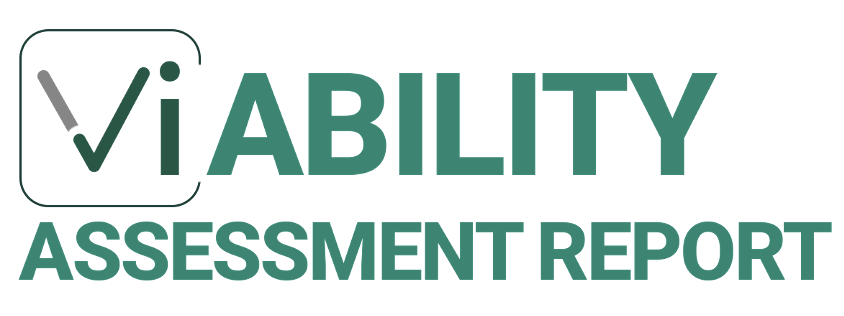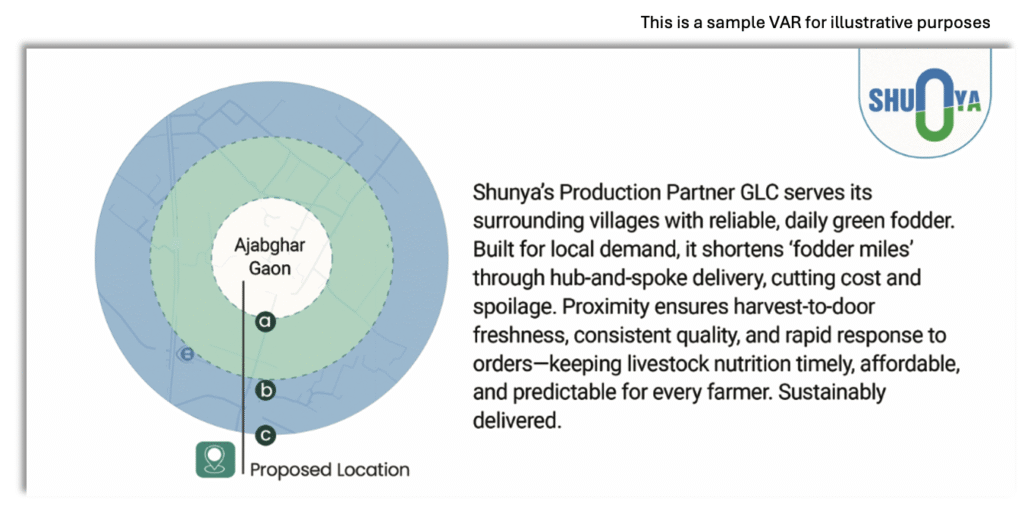Granularity:Why Local Demand Matters for Rural Entrepreneurs
When rural entrepreneurs think about starting a business, one of the biggest hurdles is knowing whether there will be enough demand in their immediate area. In India’s dairy and livestock economy, this challenge is even sharper. A fodder production business may look promising on the surface, but without clarity on local demand – the villages nearby, the number of livestock, and the size of the fodder deficit – an entrepreneur risks stepping into uncertainty.

Shunya Agritech’s Viability Assessment Report (VAR) solves this problem by delivering unmatched granularity. Instead of broad, state-level or district-level averages, the VAR drills down to the 2, 10, and 20 km radii around the prospective entrepreneur’s chosen location. This means the entrepreneur understand with clarity exactly how many villages are nearby, how many animals are being reared, and how much fodder is needed within a realistic delivery distance.
Why Granularity Matters
- Accurate Market Visibility
Most reports often paint a big-picture view – such as “fodder deficit in Uttar Pradesh is 35%.” While useful, this doesn’t tell an entrepreneur in Barabanki whether the next 10 km will support their business. The VAR bridges that gap by showing micro-level demand. - Local Demand = Local Market
Dairy farmers rarely transport fodder across long distances. Green fodder/feed, especially Nutri Ankutri Feed is bulky, perishable, and best consumed fresh. By mapping villages and demand within short distances, the VAR confirms that local demand exists – ensuring that local production finds a ready, nearby market without heavy logistics costs. - Reducing Risk in Decision-Making
For a rural entrepreneur, investing even a few lakhs is a big step. Granular data offers the reassurance that the business will be supported by demand right around their doorstep. This lowers the risk of underutilized capacity or unserved markets. More over as VAR is a free to use tool offered by Shunya Agritech – it becomes the obvious 1st step.
USPs of VAR’s Granularity vs. Others
- Micro-Catchment Approach: Most studies or schemes use state or district data – those too are dated. VAR uniquely allows catchment-level assessment – matching the entrepreneur’s real-world operating area.
- Instant & Free: No need for surveys or consultants. A simple location input unlocks detailed local data.
- Built for Indian Reality: Recognizes that in India, villages are densely packed, farmers depend on daily fodder, and logistics are limited. By showing demand at 2/10/20 km, it mirrors how entrepreneurs will actually operate.
Empowering Rural Entrepreneurs: For someone exploring whether to become a Shunya Production Partner, this granular visibility is often the deciding factor. It removes guesswork, validates the opportunity, and builds confidence. Instead of wondering, “Will people in my area buy?” the entrepreneur has hard data to support the decision.
Moreover, because the VAR is derived from verified census data, entrepreneurs know the insights are not estimates or assumptions. This transforms the VAR into a trusted guide for anyone deciding which business idea to pursue.
It would help rural entrepreneurs targeted by governments various initiatives.
A Gateway to Growth: Granularity ensures that opportunities are not abstract but tangible and local. It aligns perfectly with India’s rural entrepreneurial spirit, where businesses thrive only when rooted in community demand. By showing that local demand exists and is strong, the VAR confirms that fodder grown locally will always find a ready market locally.
For rural entrepreneurs, this isn’t just data – it’s the confidence to take the first step toward a viable, sustainable business.


